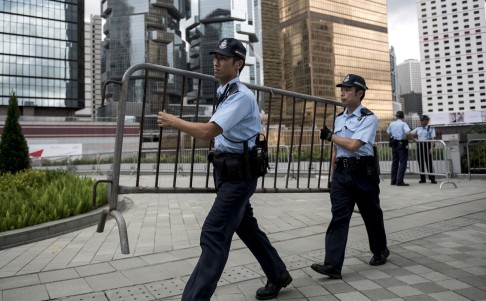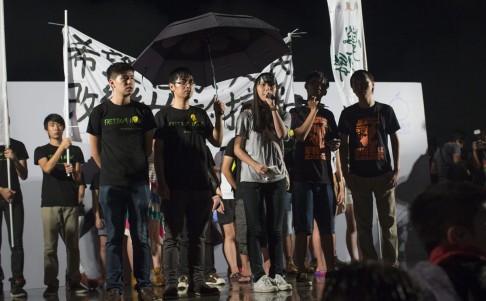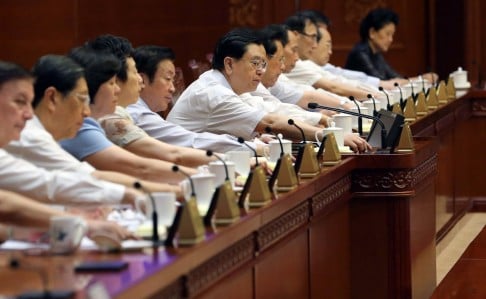http://m.scmp.com/news/hong-kong/article/1582560/take-it-or-leave-it-npc-tells-city-it-endorse-framework-2017-poll
Take it or leave it, NPC tells city as it endorses framework for 2017 poll
As top legislature endorses a tougher-than-expected framework for 2017 poll, Beijing warns that a Legco veto could harm the city's development
GARY CHEUNG, TONY CHEUNG IN BEIJING , JEFFIE LAM AND PETER SO
PUBLISHED : Monday, 01 September, 2014, 5:55am
UPDATED : Monday, 01 September, 2014, 9:27am
Occupy Central supporters rally outside government headquarters in Admiralty last night. They have vowed to push on with their campaign. Photo: Felix Wong
The nation's top legislature yesterday endorsed a tougher-than-expected framework for Hong Kong's first "one man, one vote" chief executive election in 2017 - sparking condemnation from pan-democrats and an Occupy Central vow to go ahead with its civil disobedience campaign.
The framework, approved unanimously by the National People's Congress Standing Committee, allows only two or three candidates to run. They will need approval from a majority of a 1,200-strong nominating committee. Methods for electing the committee, its composition and size will be "in accordance with" those of the election committee that decided the 2012 poll. It will be divided between four sectors and largely chosen by about 250,000 individual and corporate voters in dozens of subsectors.
The focus now moves to Hong Kong, where officials will fight to win over the five pan-democratic lawmakers they need to win a two-thirds majority for the package in the Legislative Council. But all 27 pan-democrats yesterday said they would vote against any plan based on Beijing's framework, and Occupy Central leaders said they would put into motion a series of protests culminating with 10,000 activists blocking streets in the heart of the city.
Basic Law Committee chairman Li Fei and Chief Executive Leung Chun-ying called on the public and politicians to seize the opportunity of universal suffrage. Li warned that a Legco veto could drag Hong Kong into a longer debate that would harm the city's development. "Some people say that if we don't have universal suffrage in 2017, we can do it again in five years' time. But … it would be impossible for the development opportunities that were lost to come again," Li said.
Chen Zuoer, former deputy director of the Hong Kong and Macau Affairs Office, warned Beijing would not turn a blind eye if Occupy Central spiralled out of control. If it did, Beijing would "handle the situation according to Article14 of the Basic Law", the clause under which the city government can seek help from the People's Liberation Army.
But Occupy organisers were defiant as supporters rallied outside government headquarters in Admiralty. "Today is the darkest day of Hong Kong's democratic development. The road of dialogue has come to an end and the occupation of Central will definitely happen," co-founder Benny Tai Yiu-ting said.
 Police officers carry barriers outside Hong Kong government offices as they prepare for a protest by democracy activists on August 31, 2014. Photo: AFP
Police officers carry barriers outside Hong Kong government offices as they prepare for a protest by democracy activists on August 31, 2014. Photo: AFP
Watch: Occupy Central leaders promise civil disobedience campaign in Hong Kong
The Hong Kong government is expected to bring forward a detailed reform plan later this year.
A government source said pan-democrats should give serious thought to the progress that allowing five million people to vote for their leader would represent. "Democratic development will come to a standstill if universal suffrage can't be achieved in 2017," the source said. "The central government will stick to the framework set by the Standing Committee in future."
Democratic Party chairwoman Emily Lau Wai-hing said universal suffrage went beyond "one person, one vote" with any true democratic election offering voters a real choice. "We are not North Korea," she said.
Watch: Scholarism protest against NPC decision outside of Beijing official Li Fei's hotel
 Protesters attend a rally organized by the Occupy Central with Love and Peace movement outside the Chief Executive office. Photo: EPA
Protesters attend a rally organized by the Occupy Central with Love and Peace movement outside the Chief Executive office. Photo: EPA
Additional reporting by Teddy Ng and Adrian Wan
Key points
- The nominating committee will be formed "in accordance with" the make-up of the 1,200-strong election committee from the 2012 poll
- The committee will nominate two or three candidates "in accordance with democratic procedures"
- Each candidate will need the endorsement of more than half of the committee's members
- All eligible voters will then be able to vote on the selected candidates
- The winning candidate will have to be appointed chief executive by the central governmentIf no reform plan is approved, the method of election will be the same as that used in the 2012 election
